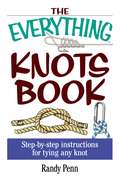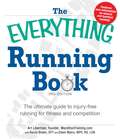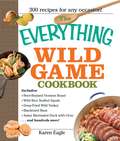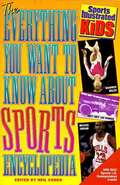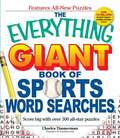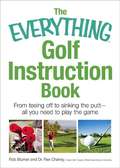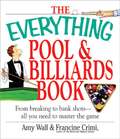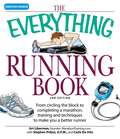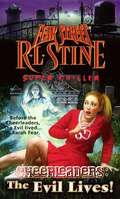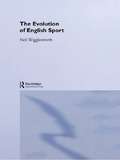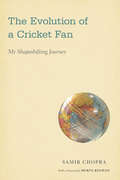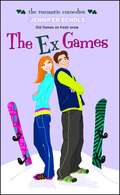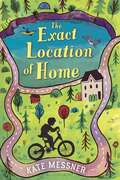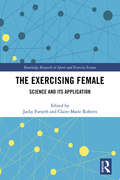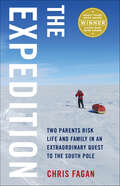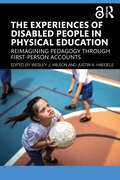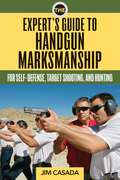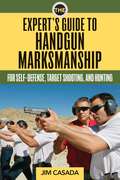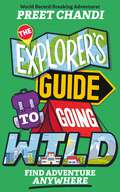- Table View
- List View
The Everything Knots Book
by Randy PennSimple instructions on how to tie over 100 useful and decorative knotsA well-tied knot is at once a practical tool and a work of art. With names like "hangman's noose" and "wagoneer's hitch," knots have a rich history of usefulness and an aesthetic appeal all their own.From the boat to the backyard, The Everything Knots Book provides simple instructions on how to tie knots for any situation. Written by Randy Penn, a member of the International Guild of Knot Tyers, this handy guide walks readers through the basics and offers myriad suggestions for creative uses of these knots.Mr. Penn shows readers how to:Choose the right rope and knot for the jobTie knots safely and securelyCreate decorative knots for clothing and accessoriesPractice knot-tying through games and exercisesPacked with easy-to-follow instructions and clear illustrations, The Everything Knots Book makes learning this useful skill fun and easy.
The Everything Knots Book: Step-By-Step Instructions for Tying Any Knot
by Randy PennSimple instructions on how to tie over 100 useful and decorative knotsA well-tied knot is at once a practical tool and a work of art. With names like "hangman's noose" and "wagoneer's hitch," knots have a rich history of usefulness and an aesthetic appeal all their own.From the boat to the backyard, The Everything Knots Book provides simple instructions on how to tie knots for any situation. Written by Randy Penn, a member of the International Guild of Knot Tyers, this handy guide walks readers through the basics and offers myriad suggestions for creative uses of these knots.Mr. Penn shows readers how to:Choose the right rope and knot for the jobTie knots safely and securelyCreate decorative knots for clothing and accessoriesPractice knot-tying through games and exercisesPacked with easy-to-follow instructions and clear illustrations, The Everything Knots Book makes learning this useful skill fun and easy.
The Everything Running Book
by Art Liberman Randy Brown DptRunning can help you lose weight, create a healthy body image, and boost your self-esteem. No matter your fitness level, you too can enjoy the benefits of this sport! With this book, you'll gain the knowledge and tools you need to run a 10K, a marathon, or just a lap around the block! The new edition includes:Cutting-edge information on hugely influential trends in natural running, including ChiRunning, barefoot running, and cross-training with yoga and meditationInformation on how to select the right gear and manage your nutrition, including details on new diets favored by endurance athletesA dedicated section on running for women, including specific nutritional and physical concernsWhether you're a beginner or a seasoned veteran, this book has everything you need to maximize your running potential--from start to finish!
The Everything Running Book
by Randy Brown Eileen MyersRunning can help you lose weight, create a healthy body image, and boost your self-esteem. No matter your fitness level, you too can enjoy the benefits of this sport! With this book, you'll gain the knowledge and tools you need to run a 10K, a marathon, or just a lap around the block! The new edition includes: Cutting-edge information on hugely influential trends in natural running, including ChiRunning, barefoot running, and cross-training with yoga and meditation Information on how to select the right gear and manage your nutrition, including details on new diets favored by endurance athletes A dedicated section on running for women, including specific nutritional and physical concerns Whether you're a beginner or a seasoned veteran, this book has everything you need to maximize your running potential--from start to finish!
The Everything Running Book: The ultimate guide to injury-free running for fitness and competition
by Art LibermanRunning can help you lose weight, create a healthy body image, and boost your self-esteem. No matter your fitness level, you too can enjoy the benefits of this sport! With this book, you'll gain the knowledge and tools you need to run a 10K, a marathon, or just a lap around the block!The new edition includes:Cutting-edge information on hugely influential trends in natural running, including ChiRunning, barefoot running, and cross-training with yoga and meditationInformation on how to select the right gear and manage your nutrition, including details on new diets favored by endurance athletesA dedicated section on running for women, including specific nutritional and physical concernsWhether you're a beginner or a seasoned veteran, this book has everything you need to maximize your running potential--from start to finish!
The Everything Wild Game Cookbook: From Fowl And Fish to Rabbit And Venison--300 Recipes for Home-cooked Meals
by Karen EagleWritten with the most exotic wild game and fish in mind, this unusual collection features delicious, original recipes designed to please any meat lover's palate, including:Deer, wild boar, buffalo, and bearPheasant, quail, and partridgeSaltwater and freshwater catchRubs, relishes, and marinadesTrimmings and dessertsExpert author Karen Eagle also reveals the secrets of cooking wild game, from the various techniques for preparing it (such as roasting and smoking) to substitutions that really work. With The Everything Wild Game Cookbook, it's not just "same-old, same-old" for supper any more!
The Everything You Wanted To Know About Sports Encyclopedia
by Neil CohenA fact-filled encyclopedia loaded with answers to sports questions. There are more than 60 sports covered here. Open to any page, and you'll discover something about sports you never knew before!
The Everything® Giant Book Of Sports Word Searches
by Charles TimmermanLove the fast-paced thrill of a high-energy basketball game? Addicted to the quiet intensity of a championship golf tournament? Dig the reckless speed of auto racing? No matter your favorite, this book will satisfy your every sports-related passion. Puzzlemaster Charles Timmerman's latest collection combines the fun of word searches with the exhilaration of popular sports for the ultimate puzzling experience! This gigantic collection features hundreds of entertaining puzzles based on the world of sports, including: Basketball Football Baseball Motor sports Hockey Golf Relive your favorite sports moments while working on these popular and addictive puzzles. With more than 300 major-league word searches, it's the next best thing to the Superbowl!
The Everything® Golf Instruction Book
by Rob Blumer Dr Rex ChaneyGolfer's Dream-Enough Details and Trivia to Entertain Every Golf Fanatic Packed with information about the game of golf, its rich history, the great players and outstanding personalities, tours and tournaments, proper etiquette, as well as anecdotes, trivia, and jokes, The Everything Golf Book really does have it all! Whether you are an avid player or an enthusiastic spectator, you'll find something new for you. From bunker shots to golfing buddy movies, this one volume highlights everything you need to know to thoroughly enjoy the game of golf.
The Everything® Knots Book
by Randy PennPacked with easy-to-follow instruction and clear illustrations, "The Everything Knots Book makes learning this useful skill fun and easy.
The Everything® Pool & Billiards Book
by Amy Wall Francine CrimiThe Everything Pool & Billiards Book features practical information on breaking, positioning, developing technique, sinking difficult shots, playing the table, pool etiquette and sportsmanship and everything else you'll need to play (and enjoy!) pool and billiards.
The Everything® Running Book
by Carlo De Vito Dstephen PributStatistics show that people who run regularly are thinner, have lower cholesterol, and live longer, healthier lives. But, as you know, getting a running regimen started isn't as easy as picking up a pair of sneakers and shooting out the door. The Everything Running Book -- written by a longtime marathon runner, a podiatrist, and a publishing professional -- is a quick and easy guide to getting started on a running program that works for you. This thorough book covers everything you need to know -- from eating right, stretching, and treating common injuries to strapping on the right pair of sneakers and hitting the track or treadmill. Book jacket.
The Evil Lives! (Fear Street Superchillers)
by R.L. StineEveryone at Shadyside High remembers when Corky Corcoran destroyed the evil spirit that attacked the cheerleaders. No one expected the evil to come back. No one knew that there was only one way to defeat it forever. No one knew that the answer lay hidden in Sarah Fear’s grave.
The Evolution of English Sport
by Neil WigglesworthThis work uses original material from clubs and sporting organizations to illuminate the evolution of sporting activity nation-wide. It relates these documents to themes such as commercialism and club fortunes. It concludes by discussing the outlook for English sport.
The Evolution of a Cricket Fan: My Shapeshifting Journey (Sporting)
by Samir ChopraSamir Chopra is an immigrant, a “voluntary exile,” who discovers he can tell the story of his life through cricket, a game that has long been an influence—really, an obsession—for him. In so doing, he reveals how his changing views on the sport mirror his journey of self-discovery. In The Evolution of a Cricket Fan, Chopra is thus able to reflect on his changing perceptions of self, and of the nations and cultures that have shaped his identity, politics, displacement, and fandom. Chopra’s passion for the sport began as a child, when he rooted for Pakistan and against his native India. When he migrated, he became a fan of the Indian team that gave him a sense of home among the various cultures he encountered in North America and Australia. This “shapeshifting” exposes the rift between the Old and the New world, which Chopra acknowledges is “cricket’s greatest modern crisis.” But it also illuminates the identity dilemmas of post-colonial immigrants in the Indian diaspora. Chopra’s thoughts about the sport and its global influence are not those of a player. He provides access to the inner world of the global cricket fan navigating the world that colonial empire wrought and that cricket continues to connect and animate. He observes that the Indian cricket team carries many burdens—not only must they win cricket matches, but their style of play must generate a pride that assuages generations of wounds inflicted by history. And Chopra must navigate where he stands in that history. The Evolution of a Cricket Fan shows Chopra’s own wins and losses as his life takes new directions and his fandom changes allegiances.
The Ex Games
by Jennifer EcholsBrace yourself for the battle of the exes.... Hayden and Nick used to be a hot item, but their brief affair ended with a highly publicized breakup. Now the two are "just friends," excluding the occasional flirtation. When Hayden wins the girls' division of a local snowboarding competition, Nick is unimpressed, claiming that Hayden wouldn't have a chance against a guy. Hayden calls Nick's bluff and challenges him to a head-to-head boarding contest. Their mutual friends quickly take sides, the girls on Hayden's and the boys on Nick's, making for an all-out battle of the sexes. This friendly competition is bound to get heated -- and they might end up igniting some old flames.
The Ex Next Door (Charming, Texas)
by Heatherly BellA charming distraction—or a sweet reunion? Recently divorced, Amy Holloway is starting fresh. After moving into a cozy new home with her energetic nine-year-old twins, she&’s focused on rebuilding her life. But when she discovers her new neighbor is her former high school sweetheart, Declan Sheridan, the past comes rushing back. Charming, handsome Declan knows he&’s been given a second chance, but winning Amy&’s heart won&’t be easy. He devises a plan to help Amy and her kids, one good deed at a time. Just when their bond deepens, Amy&’s ex-husband complicates her new beginning. Caught between familiar safety and the excitement of new love, Amy must choose what truly matters. Can she find the strength to embrace what she deserves?
The Exact Location Of Home
by Kate MessnerKate Messner pens a new moving tale of family and friendship about a tech-savvy boy searching for his father during tough times. Kirby "Zig" Zigonski lives for the world of simple circuits, light bulbs, buzzers, and motors. Electronics are, after all, much more predictable than most people--especially his father, who he hasn't seen in over a year. When his dad's latest visit is canceled with no explanation and his mom seems to be hiding something, Zig turns to his best friend Gianna and a new gizmo--a garage sale GPS unit--for help. Convinced that his dad is leaving clues around town to explain his absence, Zig sets out to find him. Following one clue after another, logging mile after mile, Zig soon discovers that people aren't always what they seem . . . and sometimes, there's more than one set of coordinates for home. An important story of love and hope that will capture readers' hearts, The Exact Location of Home is another must read from beloved author Kate Messner.
The Exercise Book for People Who Don't Exercise
by Stanford Center for Research in Disease PreventionExercise is fun. Exercise is safe. There's a form of exercise for everyone (including those who are not enthusiastic about the idea of climbing into running shoes) You'll be hooked within a few months, and wouldn't give up your exercise for anything.
The Exercising Female: Science and Its Application (Routledge Research in Sport and Exercise Science)
by Jacky Forsyth Claire-Marie RobertsThe Exercising Female: Science and Its Application is the first book to provide students, researchers, and professionals with an evidence-based reference on the exceptional scientific issues associated with female participation in sport and exercise. Based on the latest research, and treating women as a unique population, the book seeks to critically evaluate current debates, present the science underpinning female sport and exercise performance, and inform applied practice for the exercising female. Featuring contributions from leading scientists from around the world, and adopting a multidisciplinary approach—from exercise physiology, endocrinology, and biochemistry to psychology, biomechanics, and sociology—the book includes chapters on topics such as: Exercise and the menstrual cycle, contraception, pregnancy, motherhood, and menopause. Body image, exercise dependency, the psychology of sports performance, and homophobia in female sport. The Female Athlete Triad, bone health, musculoskeletal injury, and breast biomechanics. Nutritional requirements for the exercising female, immune function and exercise, and cardiovascular health. Filling a considerable gap in book literature around the science of female sport and exercise, this is crucial reading for any student studying female sport and exercise science, researchers of female sport, and any coach, sport scientist, strength and conditioning coach, sport psychologist, physician, or physiotherapist working with female athletes.
The Expedition: Two Parents Risk Life and Family in an Extraordinary Quest to the South Pole
by Chris FaganMeet Chris and Marty—a married couple working on their careers, raising their only child, and chasing big adventures. At midlife, they suddenly find themselves weighing the responsibility of parenthood against the possibility of one more grand adventure, before their aging bodies and the warming continent of Antarctica further degrade. They ultimately decide it’s time to pursue their biggest dream: Ski 570 miles from the edge of Antarctica to the South Pole. With no guide or resupply. From the lush Pacific Northwest to the barren landscape of Antarctica, Chris and Marty embark on one of the hardest challenges on the planet. After three years of intense planning and training, including meticulous preparations for the care of their twelve-year-old son, they are ready. Experience a boundless white wonderland like no other on earth. Encounter life-threatening dangers lurking in the bitter cold. Feel the intensity of 220-pound sleds, relentless wind, 40-below temperatures, and mind-numbing isolation. This is not an average couples getaway. Chris and Marty go where few others have dared on the way to making history—stretching their bodies, minds, and marriage to the limit in the process. Riveting and inspiring, The Expedition is about the power of family and community, the adventurous spirit that dwells within us all, and breaking through to feel fully alive.
The Experiences of Disabled People in Physical Education: Reimagining Pedagogy through First-Person Accounts
by Justin A. Haegele Wesley J. WilsonBringing together a set of first-person accounts of physical education from the perspectives of disabled children and adults, this book puts disabled people’s voices in the foreground.The book provides a rich set of case study material that deepens our understanding of the experiences of disabled people and challenges students, researchers, and practitioners to reflect critically upon their own positionality. The first part of the book discusses the ways in which disability has been conceptualized, how the voices of disabled people have sometimes been marginalized, and how nondisability power has historically framed the narratives of disabled people in physical education literature. It also discusses the innovative methods used in this book—such as storytelling through recorded conversations and drawings in addition to more traditional chapter writing—to empower disabled children and adults to act as authors of their own stories. Then the book presents the stories themselves in a variety of written, narrative, and alternative formats, a series of authentic accounts of the lived experiences of disabled people in physical education. Finally, the book concludes with the editors’ final thoughts and reflections about this collection of stories that can be used in the classroom to foster dialogue and encourage critical thinking. Importantly, these prompts have been co-constructed between the editors and the disabled people themselves.This book is essential reading for any course in adapted physical education, physical education, or disability, for any pre- or in-service teacher, instructor, or coach working with disabled people, and for people who experience disability or their families with an interest in education, physical activity, or methods for elevating the voices of disabled people.
The Expert's Guide to Handgun Marksmanship
by Jim CasadaFor self-defense with a handgun, target shooting, or hunting, this new book is a must read! The expertise of the world's leading handgun experts-Charles Askins, Jr., Jeff Cooper, Julian S. Hatcher, Jack O'Connor, William Reichenbach, plus excerpts from US Army Field Manuals-is brought together for the first time in this convenient pocket-sized edition-everything you need to know to improve upon your handgun marksmanship skills.This informative, 160-page, fact-filled book is guaranteed to improve your handgun accuracy.
The Expert's Guide to Handgun Marksmanship: For Self-Defense, Target Shooting, and Hunting
by Jim CasadaFor self-defense with a handgun, target shooting, or hunting, this new book is a must read! The expertise of the world’s leading handgun experts-Charles Askins, Jr., Jeff Cooper, Julian S. Hatcher, Jack O’Connor, William Reichenbach, plus excerpts from US Army Field Manuals-is brought together for the first time in this convenient pocket-sized edition-everything you need to know to improve upon your handgun marksmanship skills.This informative, 160-page, fact-filled book is guaranteed to improve your handgun accuracy.Skyhorse Publishing is proud to publish a broad range of books for hunters and firearms enthusiasts. We publish books about shotguns, rifles, handguns, target shooting, gun collecting, self-defense, archery, ammunition, knives, gunsmithing, gun repair, and wilderness survival. We publish books on deer hunting, big game hunting, small game hunting, wing shooting, turkey hunting, deer stands, duck blinds, bowhunting, wing shooting, hunting dogs, and more. While not every title we publish becomes a New York Times bestseller or a national bestseller, we are committed to publishing books on subjects that are sometimes overlooked by other publishers and to authors whose work might not otherwise find a home.
The Explorer's Guide to Going Wild: Find Adventure Anywhere
by Preet ChandiADVENTURE CAN BE FOUND JUST OUTSIDE THE DOOR A must-have book for kids who love to explore. Written by EXPLORER OF THE YEAR 2023, MBE Preet Chandi. Do you know a child who loves to explore but isn't sure how to plan their own adventures? Are they often preoccupied by an iPad when they could be outdoors? Then this is the perfect book for them! In this book, kids will learn how they can become a master explorer. Whether they want to learn how to camp in the wild, navigate their way through a new landscape, master bushcraft skills or plan a polar expedition, this book will show them how to do it.Each chapter has a mini challenge for young explorers to try at home, from learning how to read the stars to building a den. All these skills will help children to push their boundaries, build a resilient explorer mindset and get outdoors. And with fun black and white illustrations, having an adventure couldn't be easier! Written by world record-breaking adventurer 'Polar' Preet, who has been on adventures all around the world: from navigating 40 days on the Antarctic ice and a 700-mile journey to the South Pole to racing through the deserts of South Sudan. Preet shares tales of her own expeditions, big and small, as well as practical things kids can do, to inspire her readers to try new things and have their own adventures (even on their doorsteps!).Children will want to grab a copy, step outside and start creating their own adventure stories.
